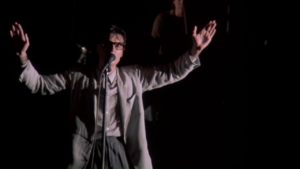And he said, ‘The kingdom of God is as if a man should scatter seed upon the ground, and should sleep and rise night and day, and the seed should sprout and grow, he knows not how. The earth produces of itself, first the blade, then the ear, then the full grain in the ear. But when the grain is ripe, at once he puts in the sickle, because the harvest has come.’
— Mark 4:26-29 (RSV)
Let him who has ears hear: ears grow in the everyday and everynight earth of practice. The kingdom is not consciously constructed, as no one knows how to do that; the role of consciousness here is to harvest the fruits of unconscious process, to let the felt sense find its expression in a form of self-control grounded in experience.
The mind’s attention to itself is really to the working memory of its (immediately prior) activity. When we engage in this recursive activity, becoming conscious of consciousness, there is a temptation to believe that we are ascending a hierarchy toward a ‘pure’ consciousness. But perhaps our consciousness of consciousness is no more conscious than was the original grounded awareness. The life of the organism depends on its awareness of the Other systems that constitute its context, not on its Self-awareness. If we believe in our arrogance that we are more than organisms, we become less than mindful, breaking the meaning cycle of the living Word manifesting itself in practice and perception.
Harvest-time comes in a flash, and when the lightning flashes it lightens the “past” as well as the “future.” Presence becomes an all-encompassing space of interbeing rather than a point on a timeline.
A pure self-consciousness would be pointlike; and according to Peirce in one of his 1903 Harvard lectures, it would be ‘the most degenerate Thirdness,’
where we conceive a mere Quality of Feeling, or Firstness, to represent itself to itself as Representation. Such, for example, would be Pure Self-Consciousness, which might be roughly described as a mere feeling that has a dark instinct of being a germ of thought. This sounds nonsensical, I grant. Yet something can be done toward rendering it comprehensible.
Peirce attempted this rendering in the form of a thought-experiment:
Imagine that upon the soil of a country, that has a single boundary line thus ○ and not ○○ or ◎, there lies a map of that same country. This map may distort the different provinces of the country to any extent. But I shall suppose that it represents every part of the country that has a single boundary, by a part of the map that has a single boundary, that every part is represented as bounded by such parts as it really is bounded by, that every point of the country is represented by a single point of the map, and that every point of the map represents a single point in the country. Let us further suppose that this map is infinitely minute in its representation so that there is no speck on any grain of sand in the country that could not be seen represented upon the map if we were to examine it under a sufficiently high magnifying power. Since, then, everything on the soil of the country is shown on the map, and since the map lies on the soil of the country, the map itself will be portrayed in the map, and in this map of the map everything on the soil of the country can be discerned, including the map itself with the map of the map within its boundary. Thus there will be within the map, a map of the map, and within that, a map of the map of the map, and so on ad infinitum. These maps being each within the preceding ones of the series, there will be a point contained in all of them, and this will be the map of itself. Each map which directly or indirectly represents the country is itself mapped in the next; i.e., in the next [it] is represented to be a map of the country. In other words each map is interpreted as such in the next. We may therefore say that each is a representation of the country to the next map; and that point that is in all the maps is in itself the representation of nothing but itself and to nothing but itself. It is therefore the precise analogue of pure self-consciousness. As such it is self-sufficient. It is saved from being insufficient, that is as no representation at all, by the circumstance that it is not all-sufficient, that is, is not a complete representation but is only a point upon a continuous map.
— Peirce, EP2:161-2, CP 5.71
